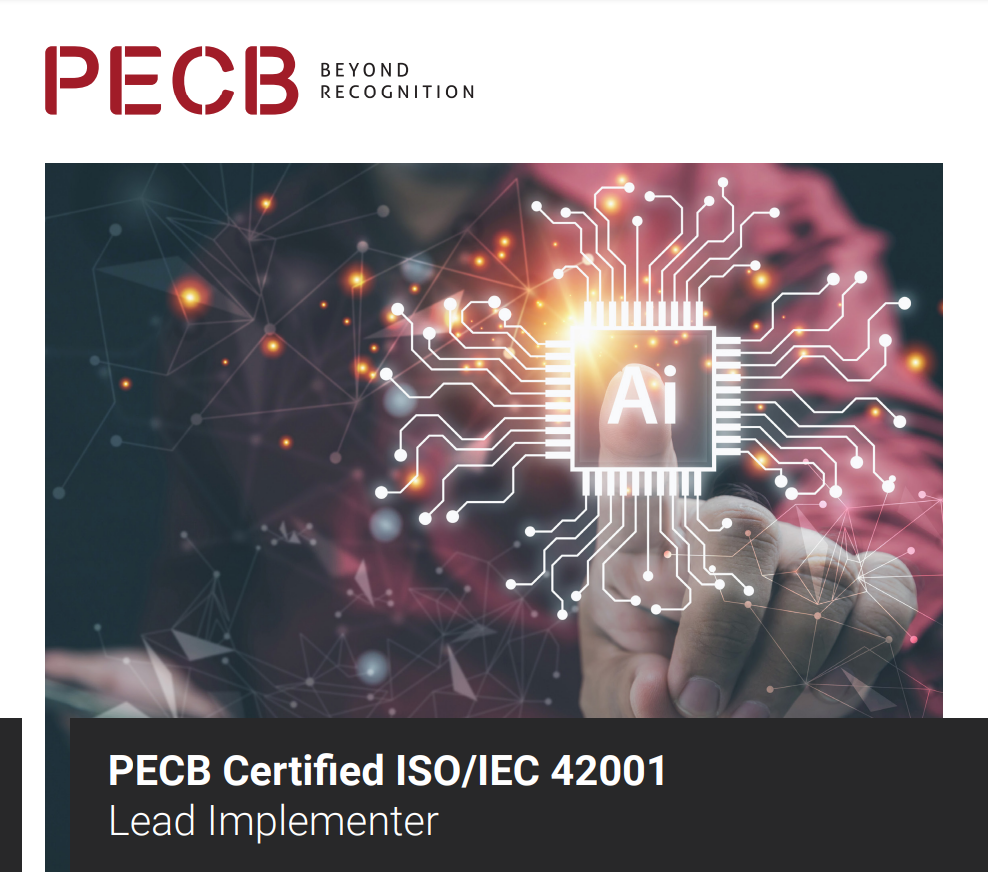
ISO/IEC 42001 Lead Auditor (Instructor-Led Online) - Artificial Intelligence Management System
Is this a Certification Course? Yes, this is a certification course. Certification and examination fees are included in the price of the training course.
Delivery Model: Instructor-Led Online
Exam Duration: 3 hours
Retake Exam: You can retake the exam once within one year
Price: US$ 1950 / CAD$ 2600
The ISO/IEC 42001 Lead Auditor training course enables you to gain the necessary expertise to audit artificial intelligence management systems (AIMS) by applying widely recognized audit principles, procedures, and techniques.
Why Should You Attend?
Artificial intelligence (AI) has become integral to the success of many organizations by enhancing efficiency through automation and improving decision-making by utilizing advanced data analytics. However, organizations should ensure the appropriate and ethical use of AI. ISO/IEC 42001 enables organizations to implement appropriate processes and controls to ensure the responsible use and management of AI system.
As the number of organizations seeking ISO/IEC 42001 compliance increases, there is a simultaneous surge in demand for skilled auditors possessing the necessary knowledge to assess and verify compliance. Therefore, PECB has developed the ISO/IEC 42001 Lead Auditor training course to empower participants with the knowledge and skills essential for planning and conducting ISO/IEC 42001 audits based on best audit practices.
The ISO/IEC 42001 Lead Auditor training course is beneficial for professionals seeking to stay ahead of the competition. This training course equips you with the expertise needed to navigate the intricate realm of AI-influenced organizational frameworks, ensuring you are well-prepared to contribute to the success of organizations in this transformative era.
After finishing the training course, you will be eligible to take the exam. After passing the exam, you will be able to apply for the "PECB Certified ISO/IEC 42001 Lead Auditor" credential. This certification proves your professional expertise in auditing organizations against ISO/IEC 42001 based on best auditing practices.
Who Should Attend?
This training course is intended for:
- Individuals with a background in auditing, whether internal or external, seeking to specialize in auditing AI management system
- Managers or consultants seeking to master the AI management system audit process
- Individuals responsible for maintaining conformity with the AI management system requirements in an organization
- Expert advisors in AI management
- Professionals involved in analyzing and understanding business requirements for AI implementation
- Individuals involved in the development and implementation of AI solutions and in designing the architecture of AI systems
Learning objectives
After completing this training course, you will be able to:
- Explain the fundamental concepts and principles of an AI management system based on ISO/IEC 42001
- Interpret the ISO/IEC 42001 requirements for an AI management system from the perspective of an auditor
- Evaluate the AI management system conformity to ISO/IEC 42001 requirements in accordance with the fundamental audit concepts and principles
- Plan, conduct, and close an ISO/IEC 42001 compliance audit, in accordance with ISO/IEC 17021-1 requirements, ISO 19011 guidelines, and other best practices of auditing
- Manage an ISO/IEC 42001 audit program
Educational approach
This training course:
- Integrates essential theoretical principles, ISO/IEC 42001 requirements, and industry-leading practices employed in AI management system audits
- Enhances lecture sessions by illustrating concepts with practical examples derived from relevant case studies
- Facilitates preparation through essay-type exercises and multiple-choice quizzes, some of which are scenario-based designed to closely replicate the format of the certification exam
Prerequisites
The main requirement for participating in this training course is having a fundamental understanding of ISO/IEC 42001 and AI principles and concepts.
Course Content
Day 1: Introduction to the artificial intelligence management system and ISO/IEC 42001
Day 2: Audit principles and the preparation for and initiation of an audit
Day 3: On-site audit activities
Day 4: Closing of the audit
Day 5: Certification Exam
Examination
The “PECB Certified ISO/IEC 42001 Lead Auditor” exam meets the requirements of the PECB Examination and Certification Program (ECP). It covers the following competency domains:
Domain 1: Fundamental principles and concepts of an AI management system
Domain 2: AI management system requirements
Domain 3: Fundamental audit concepts and principles
Domain 4: Preparing an ISO/IEC 42001 audit
Domain 5: Conducting an ISO/IEC 42001 audit
Domain 6: Closing an ISO/IEC 42001 audit
Domain 7: Managing an ISO/IEC 42001 audit program
For specific information about exam type, languages available, and other details, please visit the List of PECB Exams and the Examination Rules and Policies.
Certification
After successfully passing the exam, you can apply for one of the credentials shown below. You will receive the certificate once you comply with all the requirements related to the selected credential.
To be considered valid, the activities should adhere to best audit practices and include the following:
- Planning an audit
- Preparing audit working papers or test plans
- Reviewing documented information
- Conducting opening and closing meetings
- Conducting audit interviews
- Collecting and analyzing audit evidence
- Documenting nonconformities
- Preparing audit reports
- Following up on nonconformities
- Leading an audit team
- Managing an audit program
General Information
- Certification and examination fees are included in the price of the training course.
- Participants will be provided with the training course material containing over 450 pages of explanatory information, examples, best practices, exercises, and quizzes.
- An attestation of course completion worth 31 CPD (Continuing Professional Development) credits will be issued to the participants who have attended the training course.
- In case candidates fail the exam, they can retake it within 12 months following the initial attempt for free.
Price: US$ 1950 / CAD$ 2600

Our latest blog posts





Copyright 2025 iFactum® All Rights Reserved.



